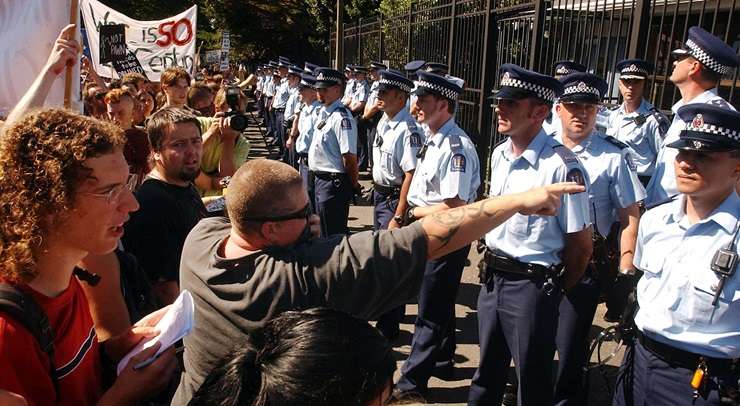If you think normal house-hunting is hard, try finding a home for an ambassador, where sniper fears are a reality and wine cellars are a must.
There are more than 40 foreign embassies or high commissions in Wellington and some 16 consular missions in Auckland and Christchurch.
That’s a lot of diplomatic and consular staff in need of accommodation. Fulfilling their long lists of requirements can be challenging, so agents in the game require patience and diplomatic skills of their own.
One Wellington agency has chosen to make the embassy crowd their specialty.
Start your property search
Harrison Vaughan, managing director of Tommy’s Property Management, told OneRoof that when he started the business seven years ago he focused on diplomats.
“We’ve established good relationships – we currently have 30 or 40 diplomatic tenancies. We’re in a lot of embassy handbooks,” he said, adding that the largest country kept 14 houses in the capital for their staff.
Discover more:
- Dame Jenny Gibbs puts $12.5m price tag on her art gallery home
- Auckland's $10m Batman apartment for sale - includes 'insane' rotating car bed
- Revealed: TV legend John Hawkesby got $12m for his Waiheke Island estate
Vaughan said that most diplomatic residencies in New Zealand were rented.
“Nowadays you won’t get an embassy buying something outright. A number lease for three to five years, and then will look at buying if they like the house,” he told OneRoof.
“Most are not buying because of the global financial situation. Their government would be examined by their opposition, same as we would do here.”
Vaughan also looks after a couple of empty former embassy houses in the capital. “An asset gets old and run-down, a country may not have the money to renovate. They’ll rent another house for their ambassador.”
Vaughan told OneRoof that many houses rented out to embassy staff were worth between $3 million and $5m. Weekly rental budgets were in the $3000 to $4000 range, although some missions spent up to $5000 a week.
Vaughan said his office would start working with an ambassador months before they made the move to New Zealand. Then, once they’ve approved the house, the fun began.

Tommy's Property Management managing director Harrison Vaughan has made the embassy crowd his specialty. Photo / Supplied
“Everything has to go through their government back home. I’ve been working with a European nation [on a property which they] first looked at in April and we still haven’t signed the lease. I’m just finalizing the draft,” he said.
Interested landlords, many of whom submit their properties for consideration through Tommy’s specialist diplomatic tenancy website, are warned rental agreements can take a long time to sign.
Houses need full-height perimeter fences for security, privacy and spaces for a flagpole and the embassy badge. Most tenants will change their own locks so landlords don’t have access, as security is key.
“I’ve had a house turned down by a country because it was over the road from an apartment building and a sniper could lie on the roof and aim for the house,” Vaughan said.
“The people on the ground here quite often have to argue with their governments back home. They don’t understand how safe it is here.”
Ambassador houses need to be big (350sqm or more) and have closed-off areas, so guests can’t see or interact with the children or catering staff, Vaughan said.
“They also like little back doors that get you directly into the kitchen, or hidden secret hallways. They all have to have grand entrances, a driveway big enough for a car turning circle, and formal dining rooms to seat at least 12 or 15 guests.”

Protestors outside the US embassy in Wellington. Security is a primary concern for diplomats looking for accommodation. Photo / Getty Images
He added: “And they do like a good wine cellar. An ambassador is allowed to bring over a certain number of bottles tax-free, and they all max it out.”
Surprisingly, many countries specifically exclude properties with tennis courts or swimming pools – because spending taxpayer money on a pool for an ambassador was not a good look, Vaughan said.
Health and safety requirements are often the most niggly for diplomat homes.
The biggest technical hurdle to overcome in Wellington is from the city’s famous hills: residences need to be drive-in and flat, not up steps and preferably with an internal access garage. Any sloping parts of the grounds need to be fenced.
“You can’t be on a hill, you can’t be in a tsunami zone. They won’t rent if there’s any risk of falling down the hill,” he said.
Some diplomatic houses change hands with the ambassador still living there.
Tommy’s colleague Barry O’Brien is currently marketing a five-bedroom ambassador’s residence (he cannot name the country) in Karori, which the country has leased for some 12 years.
The 615sqm gated property on 2500sqm of land has all the electronics and security. As well as the four bedrooms, office and games room in the main house, there’s a self-contained pavilion by the tennis court for guests or staff.
The formal dining room can seat at least 20, O’Brien said. It last sold in 2016 for $2.3m, and it now has an RV of $5.6m.
“An investor would be buying it with the tenants in place. It’s a very sizeable home for ambassadorial purposes,” he said, adding that the property brought in $200,000 annual rent, and the rates were reimbursed by the government.
Craig Lowe, owner of Lowe & Co, said that he learnt from the few embassy transactions the company has handled that everything takes a long time.
“It’s often months because they have to go through an approval process and they have a whole bureaucracy behind it,” he said.
“The time to make decisions is much slower than the market moves. The house will be sold before they make a decision, so often it would need to be an off-market deal.”
- Click here to find properties for sale











































































